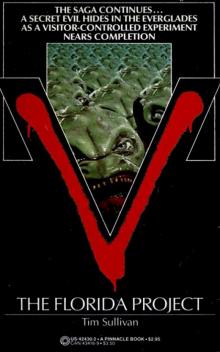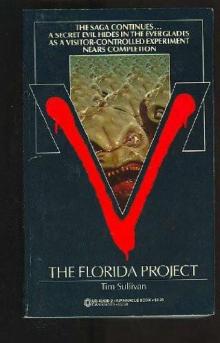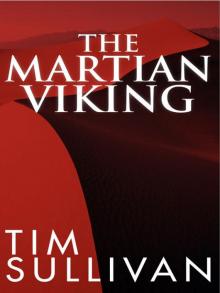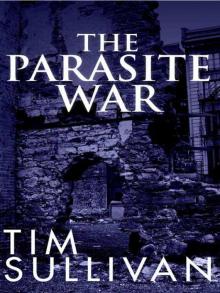- Home
- Tim Sullivan
The Martian Viking Page 9
The Martian Viking Read online
Page 9
"Ronindella," she said, the sound system picking up her voice and amplifying it without distortion. "Ronindella Biberkopf."
"And tell us Ms. Biberkopf," the preacher said, "tell the Good Lord, the faithful gathered here this evening at the Video Church of God, and tell me, your loving Brother Bobby, what you will bear witness to tonight."
"Well, Brother Bobby, I have seen up close the sins of a shirker."
The audience cooed in sympathy.
"Tell it, sister," Brother Bobby cajoled.
"My husband Johnsmith lost his job and left me and my nine-year-old son without a husband and father."
"Lord help you," Brother Bobby prayed.
"And now we have no visible means of support," Ronindella lied.
Smitty couldn't believe his ears. He scrunched way down in the pew, so ashamed that he felt as though his face were burning up. How could she say that? They were getting most of his Dad's pay all the way from Mars, and they were getting help from Ryan Effner, too!
"Is your little boy here this evening?" Brother Bobby asked.
"Yes, he's sitting out there in the audience," she replied.
The preacher's grin was dazzling, showing practically every one of his gleaming white teeth. "Then why don't we bring him up here?"
Ronindella smiled back prettily. "He's very young."
"You're never too young to bear witness for the Lord," the preacher said.
"Hallelujah!" the audience roared.
"What is your boy's name?"
"Smitty II."
"Little brother, Smitty II," Brother Bobby said in a cloying tone, "come on down."
If Smitty could have crawled under the pew, he would have. All eyes were on him, as the preacher importuned him to join them on the stage. Smitty didn't move. He felt as if he were going to burst.
"Come on down!"
What could he do? He couldn't just sit there, but he couldn't get up on that stage, either; it was just too phony. What would his Dad do if he had been here?
Smitty knew that his Dad would have done what his Mom wanted him to do, though. That was the trouble. Dad had always done what she wanted, and look what he'd gotten for his trouble. Smitty knew he'd do what his Dad would have done. If his Dad, a grown man, couldn't fight back, how could he? He sighed, resigning himself to his fate.
Slowly, he got up and marched toward the stage. Ethereal lights played around him as he made his way through the clapping, cheering crowd. Smitty hated them, he hated the preacher, and most of all at that moment, he hated his mother.
He mounted the steps and took his place next to his Mom. The crowd was feverish with excitement now, almost like a pack of wild animals. The preacher tried to speak, but the screaming drowned out even his game-show-host voice, amplified though it might have been.
At last the din died down, and Brother Bobby asked: "Are you willing to bear witness in the name of the Lord, my son?"
"I guess so," Smitty said cautiously. He didn't really understand what bearing witness was all about, but now that he was up here, he clearly had to do something. If they wanted him to bear witness, then he would bear witness. Anything, as long as he could get out of here.
"Did your father sin?" Brother Bobby asked in a kindly way. "Did you see him shirk his duty?"
"I don't know." Smitty felt as if the preacher was trying to trick him.
"Well, son, you must realize that your father lost his job. Am I right when I say that?"
Smitty nodded grudgingly. He couldn't argue with that, but he had never believed that his Dad meant to hurt him. After all, his Dad could have been sent to Luna as easily as Mars, and even Mars wasn't so great, from what Smitty had heard. What was Brother Bobby trying to prove?
"And because he lost his job, he left you and your mother without any visible means of support, wouldn't you say?"
"No, I wouldn't say so at all," Smitty responded angrily.
The preacher's grin faded for a fraction of a second. Smitty caught a glimpse of the real Brother Bobby, a wrinkled, ugly face stretched over a misshapen skull—or so it seemed for an instant. The placid smile was replaced so quickly that Smitty had to wonder if he had seen anything at all.
"Are you casting doubt on your mother's word?" Brother Bobby said.
"I didn't say that."
"Well, you certainly didn't agree with her version of events, did you?"
Smitty said nothing. He was not about to let Brother Bobby trap him into saying something he didn't really mean. He glanced at his Mom, who stared back at him with anger.
"Did your father leave you and your mother to fend for yourselves?" the preacher demanded.
"We're still getting money from Dad," Smitty said.
"But is that his doing?" Brother Bobby began to circle around Smitty, like a beast of prey closing in for the kill. Smitty turned, not letting him out of sight for an instant.
"The government of these United Nations under God sees to it that a percentage of his pay is sent through the Selective Space Service, sent to his needy family back here on Earth. Am I not correct when I say this?"
Smitty remained silent. His Dad was not some common criminal, and he would not allow this asshole to make him out that way. "I don't care if it's correct or not!" Smitty cried. "My Dad didn't mean for us to be poor!"
"Ah, but the road to hell is paved with good intentions," Brother Bobby said loftily. "Johnsmith Biberkopf has left you and your mother impoverished, has he not?"
"I don't know." Smitty was so upset and confused that he was on the verge of bursting into tears. Somehow he held back, though. He would not give Brother Bobby the satisfaction.
"You don't know?" The preacher sounded skeptical. "Are you trying to deceive a servant of the Lord?"
"No . . .I . . ."
"You do know, then?"
"No . . .I don't . . ."
"You know that your father, Johnsmith Biberkopf, is a sinner, do you not?"
Smitty wanted to scream at him, tell him that he was a liar, jump up and smash his face in. But there was something about the way Brother Bobby kept at him that made him afraid to be defiant.
"You know it, don't you, Smitty? You know it!"
And almost as if they were spoken by somebody else, the words emerged through Smitty's tears: "Yes, I know it."
NINE
JOHNSMITH DIDN'T KNOW why, but he was thinking of Felicia a lot these days, which was what he was doing now, as he lay in his bunk. Maybe it was because of the sheer boredom of living on Mars. Occasionally, he could marvel at the alien landscape outside, but most of the time it was just work; though the low gravity and atmospheric pressure made it easy to bounce back after a grueling day of crawling through red dust while a high energy particle beam fired just over the top of his head. At other times, he worked with a wieldo crew, putting up new buildings outside. He liked martial arts training better, because it was more like a sport, even though Sergeant Daiv could be pretty nasty when he punched you and tossed you around like a sack of potatoes.
They had never really been told the truth about why they were being trained for combat. Who were they expected to fight on Mars? There was nothing living on the planet, so far as Johnsmith knew, besides human beings and a bit of lichen in the polar region. They obviously weren't going to fight lichen with automatic weapons and lasers.
Well, at least they had the onees. But there were drawbacks even with the psychedelic ball bearings. For one thing, he didn't like to make his daily reports on what his onee experience were like. Filing a report never took very long, but it seemed so personal that he didn't care to have Angel Torquemada looking at it.
The lights were out, but there was some faint illumination coming from the far end of the barracks. The soft light made Felicia look very sweet and youthful. In fact, she wasn't very old, Johnsmith realized. It was just that she talked so tough that made her seem that way.
Johnsmith rolled on his side and looked down at the far end of the barracks to see what was going on. Ca
ptain Hi and Co-pilot Prudy were packing their gear. It looked as if they might be leaving Mars this morning.
Johnsmith wanted to say goodbye to Hi, who had really been very nice to him on the flight. Hi had been civil here on Mars, too, even though he had nothing to gain from it. After all, Johnsmith was just another prisoner at Elysium. He was nobody special. Maybe Hi was nice to everybody.
Since he couldn't sleep, maybe he should get up and say a few words of farewell. He might never see the pilot again; certainly not for several years, at the very least.
Johnsmith rolled out of his bunk and walked down the aisle separating the sleeping prisoners. As he approached, Captain Hi, hefting a heavy, strapped bag, smiled.
"Heading home?" Johnsmith said.
"Yeah, for a while at least," Hi replied.
Johnsmith stuck out his hand. He noticed that Prudy rolled her eyes, but Captain Hi shook hands firmly. "Some things about Mars are better, you know," he said.
"I don't know what," Johnsmith said.
"Well, for one thing, it's clean here, and it's not crowded, and there's real work that needs to be done."
Johnsmith wondered if the captain knew that they were being trained for combat against a non-existent enemy. He was about to ask Hi that very thing when somebody shouted: "Arkies!"
Arkies? Johnsmith didn't know what Arkies were, but, judging from the reactions of those around him, they were terrifying. Hi's face paled, as did those of his two crewmates.
"Shit," Co-pilot Prudy said. "Can you believe this is happening now?"
Hi didn't answer her. He merely reached into his kit and pulled out a .38 revolver. As he loaded its chamber with five shots, Angel Torquemada rushed into the room carrying a rifle with a red laser sight mounted on it. Behind him wheeled a bulky robot. Casings on its sides sprang open to reveal more rifles, grenades, and antipersonnel weapons. Whiplike appendages dispensed these to the waiting prisoners.
It suddenly occurred to Johnsmith that his question was about to be answered. Whoever, or whatever, the Arkies were, they were the antagonists the prisoners were trained to fight. He found little satisfaction in this realization, though. He was far too frightened for that.
One of the robot's flexible arms thrust an automatic weapon into his hands, which Johnsmith recognized as a Hungarian semi-automatic that he had been thoroughly trained to use. A magazine had already been inserted, and Johnsmith hefted the gun with a practiced air. He felt his heart thumping huge in his chest. He was about to meet the enemy for the first time . . .whoever the enemy was.
The clear, plastic corridor glowed red with particle beam fire. Johnsmith found it difficult to breathe steadily, and sweat began to trickle down the sides of his face. What was he supposed to do?
"One by one, out that way," Angel Torquemada said in a firm, clear voice. He pointed toward the barracks entrance. As a result, Johnsmith was among the first to go, along with Hi and his crewmates. They ran through the other buildings until they were inside the airlock leading to the landing area. Sergeant Daiv was standing by, ordering them into pressure suits as they entered the airlock in threes.
Hi, the co-pilot, and Johnsmith were the first ones through the outer door. It closed behind them immediately.
Johnsmith had not been outside since his arrival at Elysium. Despite his fear, he was struck by the totality of the Martian darkness. Only the blaze of particle beam fire momentarily lit the barren landscape. Johnsmith turned to see the airlock door opening again, and three pressure-suited figures emerged, moving cautiously with their guns held out in front of them. He hesitated to leave the compound, with its surrounding glow, even though he stood outside the buildings themselves. A crimson beam that scorched the sand near his boots made him move, and move quickly. For an instant, a plume of dust and smoke followed him, and then he was thudding through the blackness.
"Move it, move it, move it," Angel Torquemada commanded, as though he were physically inside Johnsmith's helmet. "Fan out. Don't give them a massed target to shoot at."
Johnsmith ran hard and fast, not knowing where he was going. He followed Angel Torquemada's orders as best he could, but he had no idea where the enemy was. He stumbled once, but did not fall. After that, he lifted his feet higher, feeling as though his knees might clip his chin. Torquemada's calmly issued orders—sometimes using individual names, sometimes speaking generally—sounded clearly over the ragged sound of Johnsmith's own breathing. Deadly red lines of light flashed in the night again and again.
"Biberkopf!" Torquemada shouted. "Hit the sand!"
Johnsmith's guts froze. It seemed as if he could not thrust himself to the ground, as if he could only crouch here in the dark while the particle beams crisscrossed all about him.
But somehow he went down, shocked to the bone by the impact, in spite of his pressure suit's padding. A thin, bloody thread of lethal light swept an inch or two over his head.
"Jesus!" He'd almost been killed! What the hell was he doing crawling around on his belly in the dark? He was a college instructor, for Christ's sake!
"Up, Biberkopf!" Angel Torquemada commanded.
This time, Johnsmith didn't hesitate. He leaped up and charged head first into the night. Gasping sounded inside his helmet. Somebody was running next to him, close enough to transmit her voice helmet to helmet, her body briefly illuminated by the beam flashes. Johnsmith crouched, still running. His boot struck some obstruction in the sand, and he tumbled onto the ground. Beam fire swept past him, and he heard a scream that turned into a sizzle. And then his own breathing was all that he heard.
Johnsmith felt his bladder let go, and thanked God that his pressure suit's filtering tubes would absorb it. For a moment, he felt humiliated by his incontinence. But then, as if the mechanical contrivance that had saved him from soiling himself were part of his actual physical self, he suddenly became convinced that he could not be harmed. It was insane, but he let all doubt slip from his mind. Some primal urge forced him onward toward the blaze of enemy fire. He might die if he went forward, but it would only be his body. His spirit would die if he lay in the dirt while others died around him.
A long, tortured scream rose up from deep inside him, racking his throat as it deafened him in the enclosed space of his helmet. But he took heart from his own battle cry, firing a burst in the direction of one of the red beams.
Laser fire came from the compound, and Johnsmith's courage grew with the knowledge that he and the other charging prisoners were being covered. As long as their assailants were kept busy, there was a chance that some of the prisoners might reach the enemy stronghold alive.
A red flash illuminated a running figure ahead of Johnsmith. He recognized from the man's gait that it was Captain Hi Malker. Johnsmith wondered where Felicia was.
He heard another person screaming, this one almost comically gurgling his last. Johnsmith did not stop to see who it was.
The fanning red lines of enemy fire made a V shape on the horizon, very close now. Johnsmith could see approximately where all the shooting was coming from. He didn't know how many of his people had made it this far, but he was sure that those among them who were still breathing could see the enemy's position, too.
They would be there soon. Johnsmith picked his feet up even higher, running so hard that he thought his heart would burst. Hi was just ahead now, his back looming. In another second, Johnsmith would overtake him.
Hi suddenly vanished, dropping down the back side of a mound that had been virtually invisible in the darkness. Gunshots thundered from the ancient arroyo below. The particle beam fire ceased abruptly, and Johnsmith lost his way.
He heard Hi's static-sizzled shouts, so he could not have been far away from his friend. But Johnsmith didn't know where to turn. He tried to move in the direction in which he had last seen Hi, expecting to fall into the arroyo. But he kept on running, until he was certain that he had gone too far. Trying to double back, he heard Hi's voice.
"Let go of me, you bastards," Hi shouted.
"Bring him along," an unfamiliar voice said. Johnsmith was so close to the enemy that he was patching into their helmet to helmet communications.
Grunts and gasps followed, the sounds of a struggle. But Johnsmith still had no idea of which direction the sounds were coming from. The voices became fainter, and fainter, and then faded altogether.
A searchlight swept across the darkened desert, revealing the odd prisoner crouching with weapon extended. But there was no sign of Hi and his captors.
Feet spread wide apart, Johnsmith pivoted quickly, facing in first one direction and then another while the light played over the landscape. He saw nobody but his own people. It was impossible, but there it was. Hi and his captors had vanished without a trace—in an instant.
"Where did they go?" Johnsmith cried. "What the hell is going on here?"
"All right, Biberkopf, calm down." It was Angel Torquemada. "Stay where you are—and shut up."
Johnsmith shut up, hearing only the sounds of his own breathing and the ceaseless Martian wind. Again, the searchlight swept over the battlefield. Again, Johnsmith saw nothing but sand, rocks, and his fellow prisoners. In their pressure suits, they could have been male, female, friend, or foe. But by their confused postures, he knew that these people were those he had trained with: Sergeant Daiv, Alderdice, Felicia, Frankie Lee Wisbar, and the others.
The searchlight sweep was ineffective, revealing nothing but the prisoners. Johnsmith could not imagine where the enemy had taken Captain Hi.
"All right," Angel Torquemada said, "everybody back to the compound. They're gone."
Gone? Gone where? How did they pull this disappearing act out here on a virtually flat desert? Was he hallucinating? Had the constant use of onees damaged his nervous system permanently? None of this made sense to him.
He headed back toward the compound. He had no desire to stay out here in the cold, airless Martian night any longer than he had to, despite his curiosity. As he moved toward the warm glow of the compound's lights, it occurred to him for the first time that he had just been in combat. It had been neither as glamorous nor as frightening as he had imagined it would be. He had been shot at, and he had been very close to being captured. If he had overtaken Captain Hi, it might have been him marching off towards who knew where—or cut down by beams. He was disturbed that they had taken Hi, but he was elated at the same time, knowing that he had survived mortal combat. For the first time in many months, he thought of Beowulf the Geat. Had Beowulf felt this way the first time he had carried his axe into battle, triskelion shield protecting him from the missiles of his enemies?

 The Cyclist
The Cyclist V: The Florida Project
V: The Florida Project V05 - The Florida Project
V05 - The Florida Project The Martian Viking
The Martian Viking The Parasite War
The Parasite War